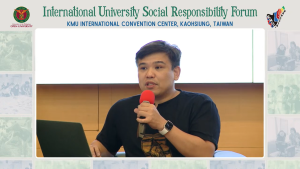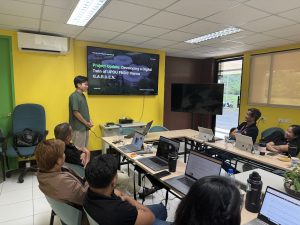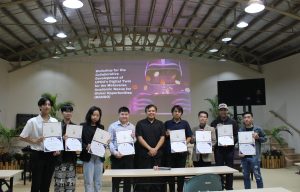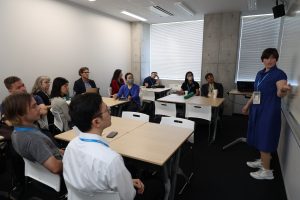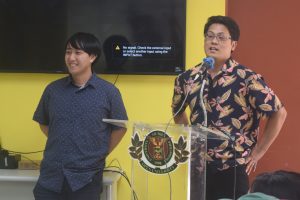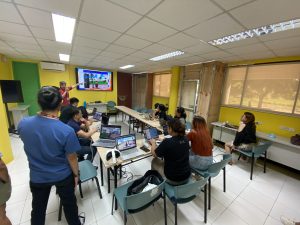
The University of the Philippines Open University (UPOU), the Mixed, Augmented, and Virtual Realities (MAVR) Special Interest Group, and the Tokyo University of Foreign Studies (TUFS) Transpacific Bridge Program recently co-organized the second World Immersive Learning Labs Symposium (WILLS 2024). The event carried the theme “Connected Realities: Bridging Cultures and Disciplines Through Immersive Experiences” and was held at TUFS in Japan from 25-27 March 2024.
and Co-Chair of WILLS2024
Japan Association for Language Teaching
Dr. Aya Fukuda, Assistant Professor at TUFS and Co-Chair of WILLS 2024, and Dr. Melinda dela Peña Bandalaria, Chancellor of UPOU, delivered the introductory remarks at the beginning of the symposium. A thought-provoking session titled: “The Confluence of AI and AR in Education” was delivered by Professor Eric Hawkinson, President of MAVR, Professor at Kyoto University of Foreign Studies, and Co-chair of the symposium. The keynote address by the University of the Philippines President, Hon. Angelo A. Jimenez, was a visionary speech that ended the morning session.
Dr. Roberto Figueroa, Jr., Program Director of the Immersive Open Pedagogies Research Program at UPOU, chaired the program and oversaw its flow while acting as master of ceremonies for the morning session. The afternoon session, moderated by Professor Hawkinson, was full of remarkable presentations and workshops delivered by researchers from Tokyo Institute of Technology, University of Glasgow, California Polytechnic State University, International Professional University, Okayama University, University of the Philippines Open University, and the Open University of Israel.
The second day was dominated by panel discussions and pechakucha presentations related to the use of immersive learning in the fields of collaborative online international learning (COIL), STEAM education, and area studies. UPOU and TUFS researchers were joined by representatives from Toyo University, Aoyama Gakuin University, Kagawa University, Purdue University, Sapporo Gakuin University, University of Dundee, and the Technological University of the Philippines in various activities throughout the day.
The first Panel Session titled “COIL and the Metaverse” which was moderated by Dr. Roberto Figueroa, featured ideas and reflections from Dr. Aya Fukuda, Dr. Gibran Mendoza Garcia, Mr. Koki Motoi, Dr. Yayoi Anzai, and Ms. Florinda Palma Gil. The second Panel Session, “Exploring New Horizons: Immersive Technology in STEAM Education,” moderated by Dr. Peter Lutes, showcased contributions and perspectives from Dr. Consuelo Habito, Asst. Prof. Al Francis Librero, and Dr. Myra Oruga. Lastly, Panel 3, titled “Beyond Boundaries: Integrating Immersive Learning in ODeL, Global Studies, and Public Management,” which was moderated by Dr. Don Hinkelman, highlighted valuable insights from Dr. Jean Saludadez, Asst. Prof. Lorena Jean Saludadez, and Asst. Prof. Lianne Angelico Depante.
Pechakucha presentations, a format for succinct and rapid sharing of ideas, done in a hybrid format with a digital twin in the metaverse (https://framevr.io/upou-exhibit) under the direction of IOP Project Officer, Ms. Jessa Perez, and UPOU CODTL Deputy Director for Educational Media Production, Mr. Lexter Mangubat, demonstrated an innovative approach to engaging with content and participants. This method not only accommodated the constraints of a global audience but also demonstrated the practical use of immersive environments for education and networking. The Pechakucha presentations were attended by the in-person symposium participants as well as online participants, including UPOU students. The second day ended with Dr. Mona Nasser’s closing keynote address about metafuturism and the metaverse.
On the third day, networking and collaboration, as facilitated through activities like the hanami and the use of immersive tools like a 360-degree camera, showcased the event’s emphasis on not just technological innovation but also community building and cultural exchange. These interactions among participants from various countries and disciplines underscored the symposium’s role in fostering a global community of educators, researchers, and technologists dedicated to advancing immersive learning.
WILLS 2024, through its wide-ranging activities and the participation of a global community, highlights the significant potential of immersive technologies to bridge cultural and disciplinary divides, offering a glimpse into the future of education where learning is not only about the acquisition of knowledge but also about experiencing and connecting with the world in new and transformative ways.
The event was attended by the UP President, Angelo Jimenez, the UP Vice President for Legal Affairs, Abraham Acosta, 19 faculty and staff members from UPOU, 2 students from the UP System, 27 faculty, students, and staff members from foreign universities, and five delegates from the Technological University of the Philippines.
Contributed by: Christine Pesimo, Hannah Gabriella Macaldo, Roberto Figueroa Jr., & Jessa Perez

